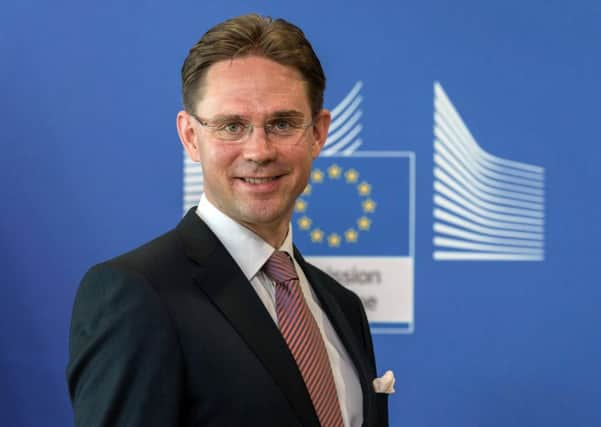‘Helping Yorkshire to compete can have impact for all Europe’


Jyrki Katainen, one of the vice-presidents of the European Commission, argued the EU had a key role to play in helping regions with slower growth to compete in the global economy.
He urged companies and the public sector in Yorkshire to do more to take advantage of the support the EU is making available to help create jobs.
Advertisement
Hide AdAdvertisement
Hide AdMr Katainen, the EU Commission vice-president for jobs and growth, said: “Yorkshire, I wouldn’t say is a small part of the EU because the size of industry and the size of the financial sector there is significant.
“If you count together all the financial sector work in its region it is bigger than some of our member states. If we manage to offer something to Yorkshire for the private sector it may have even bigger impact to the whole of Europe’s economy in job creation than what is done in some member states.”
Yorkshire has been a longstanding recipient EU funding and is due be handed £560 million in the 2014 to 2020 spending round.
But, speaking to The Yorkshire Post in his office in Brussels, Mr Katainen said the EU wanted to do more to unlock private sector-driven growth.
Advertisement
Hide AdAdvertisement
Hide AdHis major initiative is the European Fund for Strategic Investments (EFSI), a mechanism that gives the European Investment Bank scope to provide funding which makes projects less of a risk for other financial backers as a way of unlocking investment.
Two regions of France are using EFSI money to support a project to refurbish 40,000 buildings to reduce their energy costs.
EFSI is part of the wider Commission drive to support jobs and growth in response to the legacy of the financial crisis and follows the disillusionment with the EU expressed at last year’s European elections.
Mr Katainen said: “Once we manage to provide more risk financing we do hope the people will see new jobs coming and new growth coming and it may have a positive impact to their confidence towards the future.
Advertisement
Hide AdAdvertisement
Hide Ad“They may see there are issues in which the EU level can be helpful.”
EFSI also marks a move away from ploughing millions of euros of public money into projects and instead using EU cash to encourage the private sector to invest.
“There seems to be a big demand for this kind of financing and if it functions well this is ideal way to use taxpayers money, just to cover part of the risk and by doing so bring in private money and bring private investors into the heart of job creation,” he said.
The Commission also hopes to kickstart the European economy by expanding the single market.
Advertisement
Hide AdAdvertisement
Hide AdMore than 20 years since its creation, sectors such as digital and energy are still largely regulated at member state level.
Mr Katainen said: “I personally believe that this has the biggest impact to the economy and job creation over time because it gives new opportunities to SMEs and bigger companies to trade across border and also consumers to buy products cross border easier than today.”
Illustrating the kind of issues that need to be tackled, he said: “In continental Europe in one country you have to, according to law, add some fragrance to gas in order to make it possible to smell, whereas in its neighbour country it is forbidden so the gas can never go back and forth even if there was a pipeline.”
He added: “Many people take it for granted that there is a single market but there are areas in which we have to work hard to create a level playing field for consumers and entrepreneurs.”